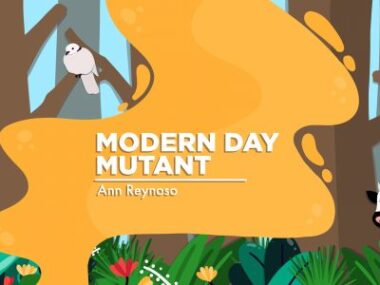The Ghost That Taught Us How to Talk Openly About Death
Written by |

In a society that shuns openly speaking about death and dying, it’s hard to find words to grapple with the terror of the unknown and the threat of imminent grief. It can be even harder to find a space in which to utter them.
When my mom, Holly, was flown to the ICU on a medevac during an acute exacerbation of her idiopathic pulmonary fibrosis, I was terrified that she would die there.
I wanted to work through that fear, but it felt like a curse to even utter the question, “What if my mom dies?” I asked it aloud only once, albeit quietly, as I was nestled safely in my husband’s arms. “She’s not going to die,” he assured me.
While his response was intended to comfort me, strangely, it felt like a door was shutting in my face.
Of course, I didn’t really want to entertain the thought that my mom might die. So, a closed door made it easier to turn around and walk away. It was much easier to think, “Of course she’ll be fine. Don’t even go there. Say no to fear, to vulnerability, and definitely to death.”
Having a “no dying allowed” attitude seemed like the brave thing to do at the time. Suppressing my fear allowed me to function as a caregiver. It also might have helped rally my mom and dad in the midst of their own fears, but I don’t know.
My survival response was necessary to keep the world from falling apart during my mom’s months-long hospitalization and double-lung transplant. But nearly three years later, I now realize it was the easy way out. I’m still finding the courage to work my way back to that tender place of asking, even in a whisper, “What if?”
After my beloved cousin Charlie passed away nearly four years ago, I’ve had many conversations about grief. I can talk about death objectively, but because I didn’t lose my mom, I’m still blissfully ignorant about the death of a parent.
So, when my best friend, a nurse in a county with high COVID-19 case rates, admitted to me that she had been consumed with fear of losing loved ones, the door that had once been slammed shut for me started to open. She explained that she had been in a funk for weeks. But with the gentle encouragement of her partner, she began to open up to him about it.
What he did next — quoting Moaning Myrtle from the “Harry Potter” series — was brilliant: “So, you’ve just been sitting in the U-bend, thinking about death?”
It diffused the tension and normalized the experience of contemplating and talking about death. Myrtle, for all her hurt and sadness, never seemed too upset about dying or being dead. In fact, she seemed at peace while describing her death. She was happy to be asked about that defining moment of her story, whereas talking about her life was gut-wrenching.
It’s funny how a few words from a fictional ghost gave my best friend and me a way to discuss death. Over the years, we both have had periods of mental paralysis caused by unspoken fears. Moaning Myrtle gave us a code to unlock the vault and bring those fears out into the open. Now, whenever either of us dwells on the uncertainties of that unsolicited certainty, we can text each other that we are “sitting in the U-bend …”
***
Note: Pulmonary Fibrosis News is strictly a news and information website about the disease. It does not provide medical advice, diagnosis, or treatment. This content is not intended to be a substitute for professional medical advice, diagnosis, or treatment. Always seek the advice of your physician or other qualified health provider with any questions you may have regarding a medical condition. Never disregard professional medical advice or delay in seeking it because of something you have read on this website. The opinions expressed in this column are not those of Pulmonary Fibrosis News or its parent company, Bionews, and are intended to spark discussion about issues pertaining to pulmonary fibrosis.








Mary
Where can I find. more of your posts. The one above is the only one I am aware of.
Christie Patient
Hi Mary, thanks for the interest in my column. All of my posts can be found here, or by navigating to "Courage to Care" under the columns tab at the top of the page.
Steve Dragoo
Hi There,
Years ago I would have had similar thoughts and sought relief watching a full fiction movie (temporary diffusion of life and reality). But today with several decades of added wisdom, I take great peace knowing we all face that eventuality. It is how we face it that matters.
So fast forward today and 5 years into IPF I know what's coming and where I will go after my rest in the grave because I have read and studied the Bible (still the most popular book on the planet) and therein is my great comfort for the promises given.
Thanks for sharing Christie - Steve
Christie Patient
Thanks for your perspective Steve. I am glad you have found comfort in the Bible and your faith. It is a great relief to many.
See you around the forums soon I'm sure :)
Christie
Steve Dragoo
Hey Christie,
I appreciate your response and want to add there is so much more to living in faith (and faithfulness) because it is a way of life and a lot of it is experiential, which makes it hard for most to understand.
Most of my life was walking around in a secular haze that disrupted truth and reality. What I am trying to say is that I could spend hours explaining my relationship with my wife for example but that would only offer a very limited but insightful explanation. It is the same with any relationship(emphasis), hard to explain, and is far better understood by experiencing it.
Stay well and safe,
Steve